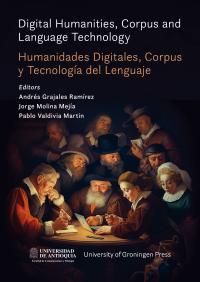Digital Humanities, Corpus and Language Technology / Humanidades Digitales, Corpus y Tecnología del Lenguaje : A look from diverse case studies / Una mirada desde diversos casos de estudio
Synopsis
Digital Humanities, Corpus and Language Technology: A look from diverse case studies is an outstanding collection of research contributions that explores the intersection of technology and the humanities. The authors provide a comprehensive overview of how these technologies can enhance research across various disciplines, from literature to history to anthropology. This book is a mustread for anyone interested in future research in the humanities. Digital Humanities, Corpus, and Language Technologies are rapidly growing fields that have the potential to revolutionize research across various disciplines.
New technologies have opened up new perspectives for research, allowing scientists to analyze data in previously impossible ways. The interdisciplinary approach and practical applications make it an invaluable resource for researchers, students, and anyone interested in the intersection of technology and the humanities.
This publication is peer reviewed.
Typesetting: LINE UP boek en media bv: Mirjam Kroondijk
Cover design: Bas Ekkers
Published by University of Groningen Press
Broerstraat 4 9712 CP Groningen
In co-edition with Facultad de Comunicaciones y Filología, Universidad de Antioquia (Colombia)
Production support: LINE UP boek en media bv
You can order our printed books via the order button, distribution is handled by our partner Publisher kleine Uil. You can also purchase our books through the regular bookshops.
Mainly due to a software update and a new way of presenting this edited volume with separate landing pages per chapter, the old download statistic of this book has disappeared, the number of pdf downloads until 1 July was: 1421
Chapters
-
Preface
-
Introduction/Introducción
-
Part I Digital Humanities
-
Understanding Outsider Art in the context of Digital HumanitiesEntender el Arte Outsider en el contexto de las Humanidades Digitales
-
La Biblioteca Virtual de la Filología Española (BVFE) y su acervo hispanoamericanoThe Biblioteca Virtual de la Filología Española (BVFE) and its Hispanic American heritage
-
De dos bases de datos relacionales a una base de datos XML. El proyecto COMREGLAFrom two relational databases to an XML one. Project COMREGLA
-
Análisis del epistolario del coronel Anselmo Pineda con Python: una mirada al proyecto coleccionista y al territorio desde las redes sociales y el aprendizaje automáticoAnalysis of Colonel Anselmo Pineda’s epistolary with Python: a glance to the collecting project from the study of the territory and social networks
-
Part II Corpus construction
-
Desarrollo de un corpus de atlas lingüísticosDevelopment of a corpus of linguistic atlases
-
The C-ORAL-BRASIL proposal for the treatment of multimodal corpora data: the BGEST corpus pilot projectLa propuesta del C-ORAL-BRASIL para el tratamiento de datos multimodales en corpus: el proyecto piloto del corpus BGEST
-
Las tecnologías del lenguaje y las lenguas indígenas mexicanas: constitución de un corpus paralelo amuzgo-españolHuman language technology and the indigenous languages in Mexico: the Amuzgo-Spanish parallel corpus
-
Methodological bases: the construction of a corpus for the detection of deception and credibility assessmentBases metodológicas: la construcción de un corpus para la detección de mentiras y la evaluación de la credibilidad
-
Türkisch für Anfänger: propuesta de un corpus del alemán coloquial actual, ejemplificado a partir de las fórmulas rutinarias de saludoTürkisch für Anfänger: proposal of a corpus of modern colloquial German, exemplified from routine phrases for greetings
-
CLEC - Colombian Learner English Corpus: first learner corpus of written production in English online in ColombiaCLEC - Corpus Colombiano de Aprendices de Inglés: primer corpus de producción escrita de aprendices de inglés en Colombia disponible en línea
-
Part III Corpus analysis and Natural Language Processing
-
Pronunciation of consonant clusters in Spanish speakers based on the Czech read speech corporaLa pronunciación de los grupos de consonantes en hispanohablantes basándose en el corpus oral leído checo
-
Relacionando los análisis cualitativo y cuantitativo. Una propuesta de modelo estadístico predictivo para completar la descripción compleja de los verbos cognitivosRelating qualitative and quantitative analysis. A predictive statistical model proposal to complete the complex description of cognitive verbs
-
Use of Bayesian networks for the analysis of corpus of local problems related to the Sustainable Development GoalsUso de redes Bayesianas para el análisis de corpus de problemas locales relacionados con los Objetivos de Desarrollo Sostenible
-
Correlación entre la metáfora orientacional bueno es arriba / malo es abajo y polaridad positiva/negativa en verbos del español: un estudio con estadística de corpusCorrelation between the orientational metaphor good is up / bad is down and positive/negative polarity in Spanish verbs: a study with corpus statistics
-
UnderRL Tagger: a free software for Under-Resourced Languages POS taggingUnderRL Tagger: un software libre para etiquetar POS en Under- Resourced Languages
Downloads
Total downloads: 1505

Published
Categories
License

This work is licensed under a Creative Commons Attribution-NonCommercial-ShareAlike 4.0 International License.



